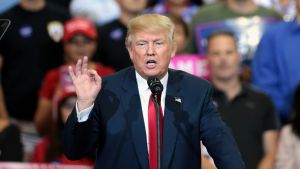The Trump Presidency: One Year Later
McKay Coppins moderated a discussion with David Axelrod, Timothy Naftali, and Kori Schake to discuss how the first year of the Trump presidency will be judged by historians in years to come.
About This Event
The first year of President Donald J. Trump’s administration has been unlike that of any other American president. Trump’s prolific use of Twitter, willingness to reevaluate long-held policies and alliances and populist nationalism have made a significant impact on his presidency and his party. Meanwhile, the administration’s efforts in the coming year to contain the threat posed by North Korea, deal with a resurgent Russia, and broker peace in the Middle East will help shape its ultimate legacy. How will the first year of the Trump presidency be judged by historians in years to come? Is the American presidency as an institution being changed in ways that will have an impact on future officeholders and the country as a whole?
About the Speakers
David Axelrod
Director, Institute of Politics; Former Senior Advisor to President Barack Obama

David Axelrod is the director of the Institute of Politics at the University of Chicago. Axelrod began his career as a reporter and columnist for the Chicago Tribune before opening his own political consultancy firm where he managed local, state, and national campaigns.

Timothy Naftali
Clinical Associate Professor, New York University; Presidential Historian, CNN
Timothy Naftali, Clinical Associate Professor, New York University; Presidential Historian, CNN
Kori Schake
Director of Foreign and Defense Policy Studies, American Enterprise Institute

Prior to the American Enterprise Institute, Kori Schake was the deputy director-general of the International Institute for Strategic Studies in London. She has had a distinguished career in government, working at the US State Department, the US Department of Defense, and the National Security Council at the White House.

